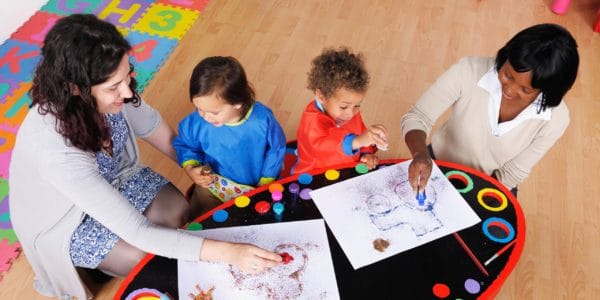A new Nuffield-funded report from the Education Policy Institute (EPI) examines how the government can develop the early years workforce in England, in order to improve the quality of provision.
The report finds:
- There is little evidence that recent government policies have improved the qualification levels of the early years workforce.
- However, the Graduate Leader Fund policy introduced under New Labour (2007-2011) had a positive impact on worker qualifications – with more highly-qualified workers joining the early years workforce as a result.
- The government should learn from the success of this policy and develop a strategy that incentivises the early years sector to invest in and upskill their staff.
- Failure to support and develop the workforce could adversely impact on the quality of early years provision.
Early years education can play a critical role in a child’s life outcomes. Research shows that supporting and developing the early years workforce is central to delivering high quality provision for families.
Which policy interventions have been most successful in developing the early years workforce?
Examining four major early years policies spanning nearly 15 years, the researchers found:
- There is little evidence that more recent government policies from 2014 have improved workforce qualifications.
- The expansion of entitlements was accompanied by an increase in the total number of early years workers, from 272,900 workers in 2014 to 298,500 workers in 2018. Despite this rise in numbers among the workforce, qualification levels over this period failed to improve.
- The introduction of the minimum GCSE grade requirement for key staff created difficulties in attracting highly qualified workers to the sector, and hindered providers’ ability to develop early years professionals.
One successful policy was the Graduate Leader Fund (2007-2011), which demonstrated a clear, positive effect on the qualifications of the early years workforce:
- Between 2007 and 2011, when funding for the Graduate Leader Fund was ring-fenced, the number of early years workers with a bachelor’s degree or equivalent increased considerably, by 76%, from 16,500 workers to 29,100 workers.
- The number of early years workers with a master’s degree or equivalent also increased, by 13% from 5,200 workers to 5,900 workers.
- Qualification levels more broadly also increased: the number of workers with a diploma in higher education increased by 7% (from 16,200 to 17,300), while those with an NVQ level 3 or equivalent increased by 38% (from 86,100 to 118,800).
- The Graduate Leader Fund had a number of characteristics of success lacking in other policies: it was evidence-based, set within a long-term workforce strategy (the Ten Years Strategy for Childcare), sufficiently funded and provided strong incentives to attract highly qualified staff.
Recommendations
The study identified that the present government lacks a long-term strategy to develop the early years workforce. Such a strategy is central to improving the quality of early years education and supporting the outcomes of the most disadvantaged children.
The researchers recommend the government renew its commitment to improving the skills of the workforce and establishing a long-term vision for developing the sector. The government should revive its Early Years Workforce Strategy, which provided an overarching framework for policy development, early years programmes and funding.
Information on the career paths and qualifications of early years workers in England is highly fragmented and often inaccessible. The government should establish an online data collection system for all early years workers, based on a similar model in the United States. This would give practitioners, providers, researchers and policy-makers access to information regarding worker qualifications, skills, career paths and training.
Sara Bonetti, Director of Early Years at the Education Policy Institute (EPI) and author of the report, said:
“Policymakers frequently make pledges on providing quality early years education for families, but this can only be realised if there is a highly-qualified workforce in place to deliver it. This report shows that many interventions over the last decade have failed to do enough to either attract those with higher qualifications into the sector or develop the skills of existing workers.
“The government should draw lessons from those policies that have been successful and develop a long-term plan for upskilling workers for the new decade. Failure to secure the workforce could threaten the quality of early years provision, and risks widening the attainment gap.”
“Previous Nuffield-funded research has shown that a highly-skilled early years workforce can significantly boost children’s outcomes. Yet this latest report from the Education Policy Institute suggests that short-term and fragmented Government policies have done little to support early years staff in improving their qualification levels. It is clear – from the success of the Graduate Leader Fund – that only evidence-based, long-term policy that is sufficiently funded, can bring about real improvement in early years education.”Josh Hillman, Director of Education at the Nuffield Foundation



















































